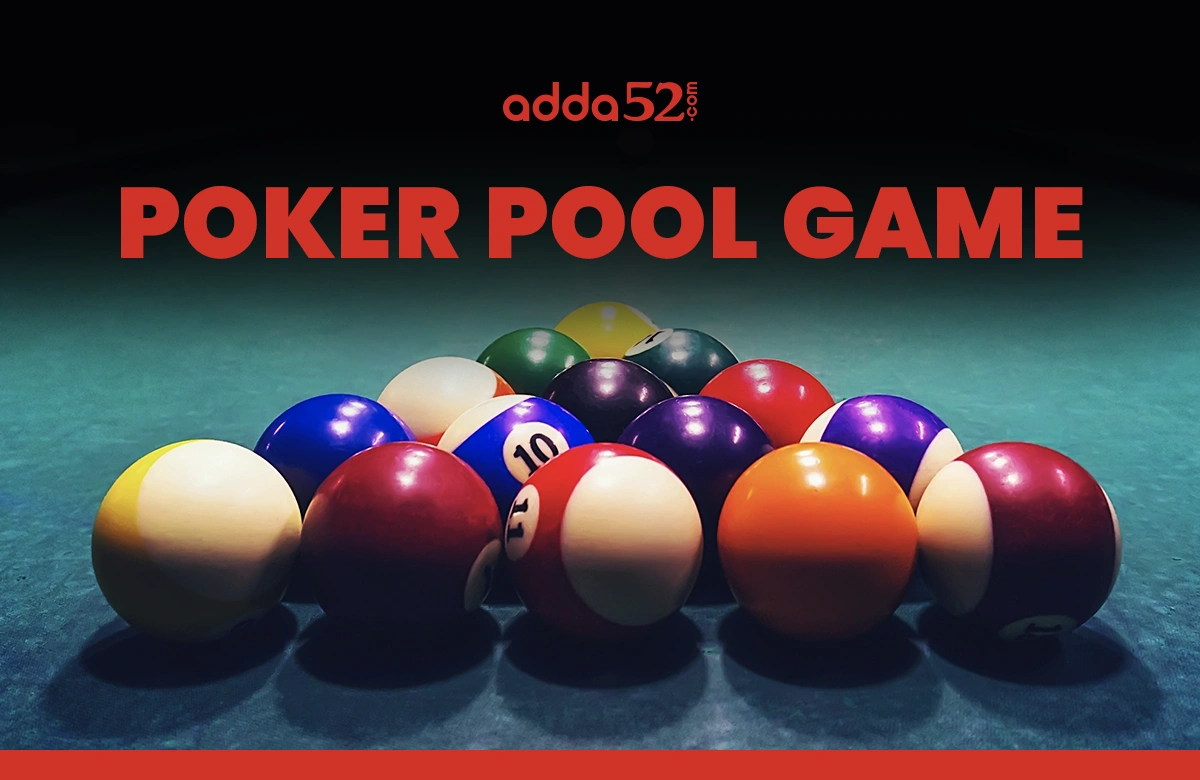
Introduction
The poker pool enjoys widespread popularity globally as it offers a mix of focus, strategy, and skill. Understanding its core principles is essential for maximising enjoyment before stepping up to the game table armed with a pool cue and deck of cards. This article explains the basics of how to play poker pool, including the objectives and rules. It also delves into the nuances of card values and how they correspond to the pool balls on the table, providing a clear understanding for new players. The article also explores various popular variations of Poker Pool catering to diverse player preferences.
What is Poker Pool Game?
Poker pool, also known as poker billiards or 8 Ball pool poker, is a fun and challenging game that combines poker and traditional pool elements. It is played on a standard pool table with a complete set of pool balls and a deck of playing cards.
While the exact origins of the poker pool are unclear, it gained popularity in the latter half of the 20th century, particularly in pool halls and bars where players enjoyed billiards and card games. Over time, game variations emerged, with players experimenting with different rules, hand values, and scoring systems to suit their preferences.
Objective
The objective is to pocket balls in a specific order to form the best possible poker hand. You will need a pool table, a full set of pool balls, a cue ball, and a deck of playing cards to play the game.
Poker Pool Rules
- Poker Pool combines poker and billiards, played on a pool table.
- It requires a standard set of billiard balls, cue balls, and 52 cards.
- The balls are numbered from 1 to 15, plus a cue ball.
- Players rack the balls in a triangle formation as in a traditional pool.
- Each player is dealt five cards from a standard deck of 52.
- Players take turns shooting the cue ball to pocket-numbered balls.
- The goal is to create the best poker hand by the end of the game.
How to play Poker pool: Step-by-step Guide
Here's a detailed guide on how to play poker pool:
- Rack the pool balls in a triangle at the foot of the table, just as you would for a standard game of 8-ball or 9-ball.
- Shuffle the deck of cards and deal five cards to each player. Players keep their cards secret from each other.
- Players can determine who goes first through any agreed-upon method, such as flipping a coin or drawing cards from the deck.
- The first player takes their turn by striking the cue ball with their cue stick, aiming to pocket a numbered ball.
- Each pocketed ball corresponds to a specific type of poker hand. The order in which the balls are pocketed determines the hand.
Pocket the 1-ball for a High Card hand
Pocket the 2-ball for a Pair
Pocket the 3-ball for Two Pairs
Pocket the 4-ball for Three of a Kind
Pocket the 5-ball for a Straight
Pocket the 6-ball for a Flush
Pocket the 7-ball for a Full House
Pocket the 8-ball for Four of a Kind
Pocket the 9-ball for a Straight Flush
Pocket the 10-ball for a Royal Flush
- Once players have pocketed a ball, they reveal their hand by showing the corresponding cards. Players can choose which cards to reveal to form the best possible hand.
- Keep track of each player's hands and scores. A typical scoring system assigns points based on the rank of the poker hand formed, with higher-ranking hands earning more points.
- Players take turns shooting until all balls are pocketed or until an agreed-upon number of rounds has been completed.
- The game typically ends after a predetermined number of rounds or when all balls have been pocketed.
- The player with the highest total score at the end of the game wins.
Card Value In Poker Pool Game
In poker, each player receives 5 or 7 cards, which they keep hidden from the other players. The excitement begins here. Each card in your hand corresponds to a numbered ball on the table. This straightforward system allows the balls to represent your cards' numbers accurately. Take a look at how this works below.
Ace = 1 ball
2 = 2 ball
3 = 3 ball
4 = 4 ball
5 = 5 ball
6 = 6 ball
7 = 7 ball
8 = 8 ball
9 = 9 ball
10 = 10 ball
Jacks = 11 ball
Queen = 12 ball
King = 13 ball
Variations of Poker Pool
Here are some popular variations of poker pool -
Seven-Card Stud Poker Pool
- This variation closely follows the rules of Seven-Card Stud poker.
- Each player is dealt seven cards instead of five.
- Players must pocket balls using their seven cards to form the best poker hand.
- The order in which the balls are pocketed corresponds to the order in which the cards are revealed.
Texas Hold'em Poker Pool.
- Based on the popular Texas Hold'em poker game.
- Each player is dealt two hole cards face down, and five community cards are dealt face up in the centre of the table.
- Players use their hole cards in combination with the community cards to form the best possible poker hand.
- The order in which the balls are pocketed corresponds to the order in which the community cards are revealed.
Speed Poker Pool
- It is a fast-paced variation designed to keep the game moving quickly.
- Players are dealt only three cards instead of five.
- Players must pocket balls to form the best poker hand using their three cards.
- The game has a time limit for each turn to prevent players from taking too long to make decisions.
Wild Card Poker Pool
- It incorporates wild cards into the game to add an element of unpredictability.
- Before the game begins, players agree upon which cards will serve as wild cards.
- Wild cards can be substituted for other cards to help players form better poker hands.
- The order in which the balls are pocketed corresponds to the order in which the wild cards are revealed.
No-Limit Poker Pool
- Removes betting limits, allowing players to wager as many points or chips as they desire.
- Players can go all-in at any point, risking their points or chips on a single hand.
- This variation adds excitement and strategy, as players must carefully manage their resources to avoid running out.
Team Poker Pool
- Players form teams and work together to achieve the highest total score.
- Each team member takes turns shooting but can strategize and collaborate on which balls to pocket and which cards to reveal.
- Teammates can also share information about their hands to help each other make better decisions.
Lowball Poker Pool
- Players aim to form the lowest possible poker hand rather than the highest in this variation.
- Balls are pocketed in the same order as in a traditional poker pool, but players try to avoid pocketing high-numbered balls.
- The player with the lowest total score wins at the end of the game.
Frequently Asked Questions
What equipment do I need to play poker pool?
You'll need a pool table, a full set of pool balls, a cue ball, and a deck of playing cards.
How do you determine who goes first in the poker pool?
Players can determine turn order through various methods, such as flipping a coin, drawing cards from the deck, or any other agreed-upon method.
Can you play poker pool with more than two players?
Yes, a poker pool can be played with two or more players. However, the game may take longer with more players, so it's essential to establish rules and keep the game moving.
What happens if I pocket a ball out of order in the poker pool?
Pocketing a ball out of order typically results in a foul. The opposing player may have the option to reposition the cue ball or take it in hand behind the head string.
Conclusion
Poker pool offers a fusion of two beloved games, combining strategy andpoker skills with the precision and technique of a pool. Whether you prefer the traditional rules of the poker pool or enjoy experimenting with innovative variations, the game offers unlimited opportunities to fuel your competitive spirit and hone strategic thinking. So gather your cue stick, shuffle the deck of cards, and begin your journey through the world of poker pool NOW!
